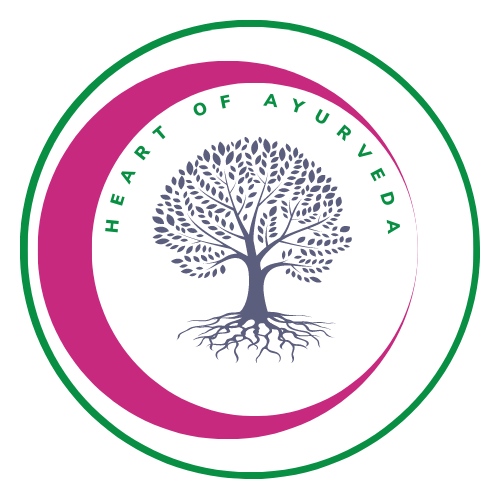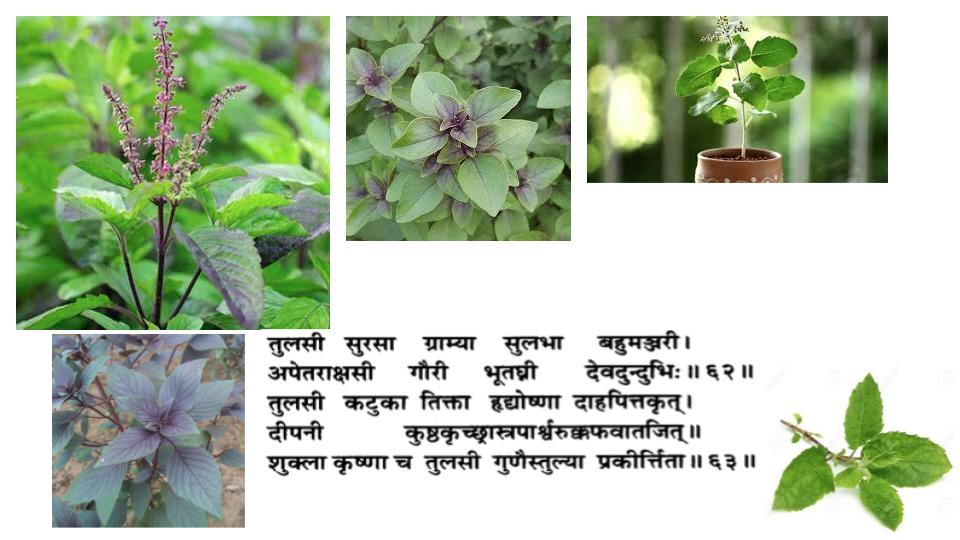This plant belongs to the same family as our common basil.
It’s physical aspects & properties are a bit different as well as it’s uses.
Tulsi is defined by “the mother of the nature medicine”, “the incomparable”, “the Queen of the herbs.” She represents one of the best example of the holistic approach of Ayurveda. There are two varieties of the small tree originally from the centre of India: Rama & Shri Tulsi with green leaves & krishna tulsi with black leaves. Each has a slightly different morphology & phytochemistry.
In Hinduism, Tulsi is a holy plant, any household that does not have it is considered as incomplete. Cultivation & respect of the plant links the caretaker to the creative power of nature, a connection that heals naturally. It is a plant easy to find connecting 2 aspects : one medicinal another is religious.
All parts of the plant can be used : leaves, seeds, roots….
The leaves contain an essential oil which crystallize in the form of “basil campher.”
It’s chemical components are eugenol, cinnamyl 𝛃-acetate, elemene.
The essential oil contains bornyl acetate, camphène & camphor…. it works a bit like silymarin inside Mary’s card. The adaptogen properties of Tulsi are more important.
The seeds are mucilage rich & so have an action in cases of minor constipation. Where only mechanic action is necessary, the seeds are useful in dysuria, pyuria, burning, micturation, nephritis, urinary stones, warming energy make them easy to digest & equilibrates earth & water elements as well as air & ether elements.
Tulsi plants also has the following properties : aperitive, carminative, and stimulant of cardiac functions. It is used in cases of cough, cold, asthma, respiratory tract disorders, flanks pain, dysuria, worms & bacterias, skin diseases, indigestion, ulcers, it gives strength to tendons & ligaments. Tulsi plants have been proven to offer anti-microbial, anti-fongic, anti-viral, anti-inflammatory & chemoprotective, as well as stress protective properties. Tulsi regulates the blood glucose, the lipids level & the HBP. In addition, it also is a huge anti-poisonous plant against heavy metal poisoning.
In cases of toxins, protection from the plant is explained by phenolic compounds that are even more pronounced in the krishna tulsi (the black variety). The antioxidant power offers a better protection against chemical products & the protection against cancer can be translated by a decrease in DNA mutations at the cellular level. Tulsi provides an antidepressant effect by lowering the stress levels, anxiety & clears the mind.
Tulsi can be consumed as a juice, thea or simply dried up and powdered with hot water, honey or milk depending on the case.
Cough & fever recipe :
take 21 leaves of Tulsi, put them in water with 5 cloves add ½ ginger crushed (if you can bear the heat out of it), smash everything together & heat on a low fire. do not boil it, once warm just filter it & add pine tree honey & water.
References to deepen the subject :
1. World Health Organisation. Preventing Chronic Diseases: A Vital Investment: WHO Global Report.Geneva: World Health Organization; 2005. Department of Chronic Diseases and Health Promotion; p. 18.
2. Bast F, Rani P, Meena D. Chloroplast DNA phylogeography of holy basil (Ocimum tenuiflorum) in Indian subcontinent. ScientificWorldJournal. 2014;2014:847–482.
3. Singh N, Hoette Y, Miller R. Tulsi: The Mother Medicine of Nature. 2nd ed. Lucknow: International Institute of Herbal Medicine; 2010. pp. 28–47.
4. Mahajan N, Rawal S, Verma M, Poddar M, Alok S. A phytopharmacological overview on Ocimum species with special emphasis on Ocimum sanctum. Biomed Prev Nutr. 2013;3:185–92.
5. Tulsi – Ocimum sanctum: A herb for all reasons, Marc Maurice Cohen.
6. The Clinical Efficacy and Safety of Tulsi in Humans: A Systematic Review of the Literature, Negar Jamshidi and Marc M. Cohen *
7. Holy basil, Beverly Yates, ND
8. A review on: Indian traditional shrub Tulsi (ocimum sanctum): The unique medicinal plant Kaushik Vilas Kulkarni and Dr. Belvotagi Venkatrao Adavirao
Sushruta Sahmita, Ashtanga Hridayam, Bhava prakasha translated by Vd Beatrice for Heart of Ayurveda © all rights reserved.
Venez nous voir pour une consultation en naturopathie ayurvédique, bilan alimentaire, un massage ayurvédique, un cours de yoga, d’Ayurveda ou un soin adapté à vos besoins!
This article is not substituting itself to a medical appointment, neither an ayurvedic conselling, please think to ask heath professional before doing anything.

